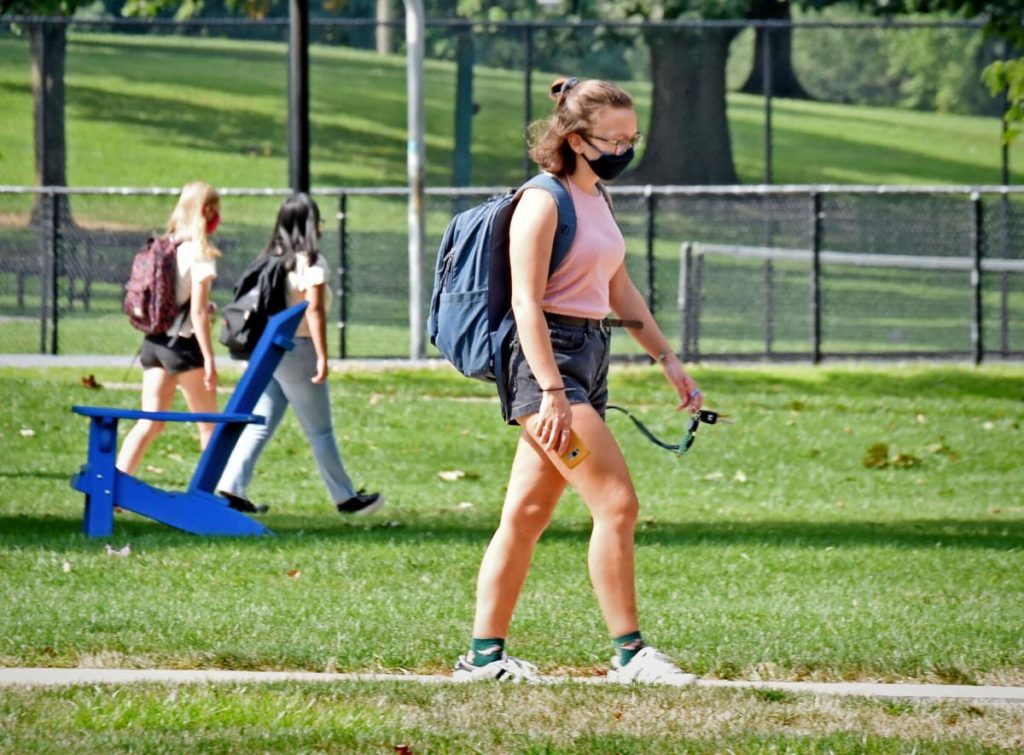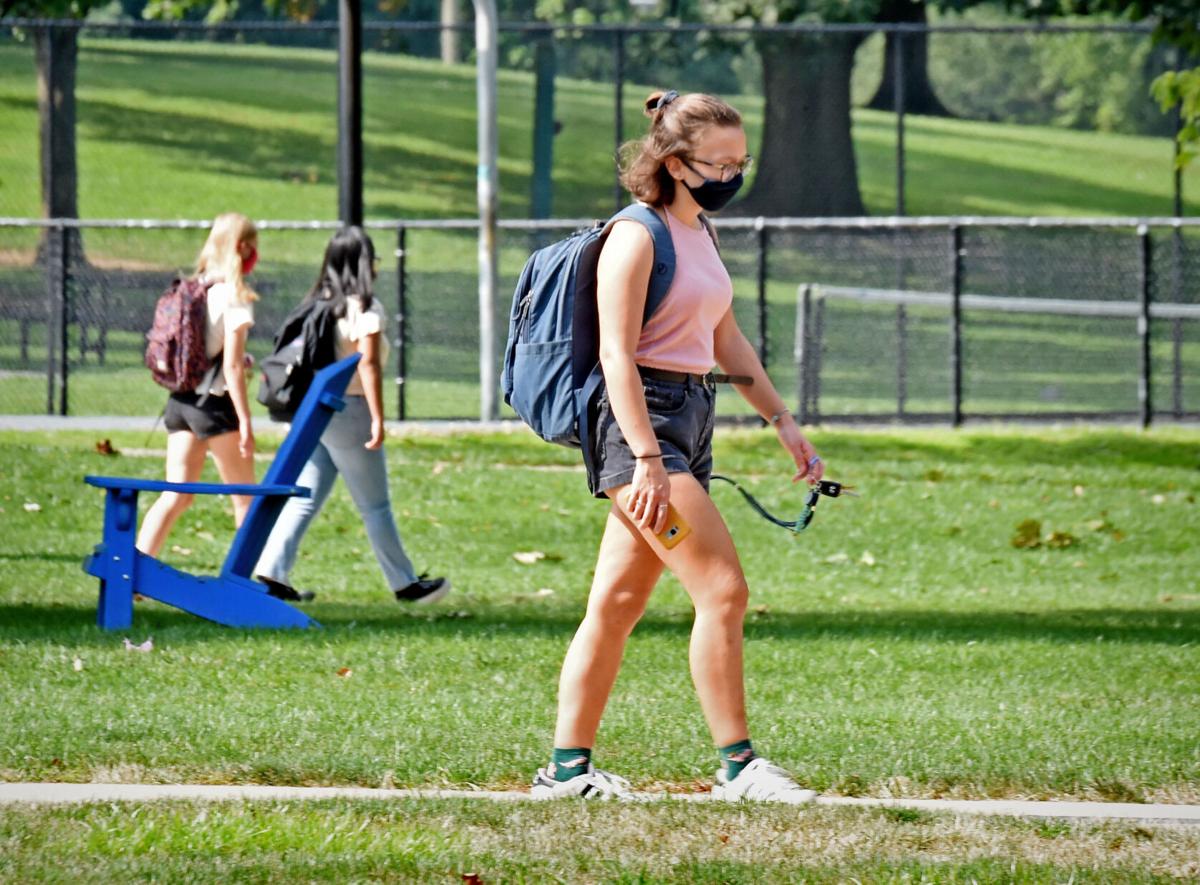By Lily Vining || Contributing Writer

In a typical year, the move-in weekend at F&M for first-year students is a sight to behold. As the family’s car drives up, a rush of upperclassmen run from their college house to meet the new student, eager to collect all of their belongings and move them into the tightly packed double room. Before long, the student is hugging their family goodbye and being whisked away to one activity after another. Orientation, meetups, and club fairs soon book every hour of the students’ schedule before the semester kicks off.
However, this year on August 20th and 21st, Franklin & Marshall campus was close to barren. If an outsider were to stroll through the grounds during that first Saturday, they would never imagine that over 600 students were sitting inside their dorms, anxiously awaiting Covid-19 test results from the previous days. The only interaction students had during the first 72 hours consisted of masked greetings in the halls and bathrooms, and standing in orderly, spaced apart lines to retrieve their boxed dining hall meals. Oh, and one cannot forget the carefully planned, yet incredibly impersonal, Zoom calls that replaced Convocation, lantern ceremonies, and crew meetings. Despite all of the efforts of the college and housing advisors, many students struggled with feelings of isolation as they spent their first nights in a new place without social gatherings and activities to occupy themselves.
Even after many students were released from their initial quarantine period, any first-years from one of the sixteen “red states” hit hardest by the Coronavirus, such as Aviva Katz, remained inside for almost two weeks. As a student in extended quarantine, Katz found herself cut off from others in her hall when the initial quarantine period was up. Upon her release, Katz discovered that most of her peers had already formed friend groups that were now more difficult to join. The extended quarantine period served to only intensify the feelings of loneliness that plagued every student.
As students adjust to living away from home and taking on challenging classes, they face the difficult task of making social connections in a new place—while maintaining the F&M Pledge they signed upon arrival. This pledge instructs students to wear a mask whenever they leave their rooms, keep a distance of at least six feet from their peers, and avoid gathering in large groups, both inside and outside. These rules, though carefully written to ensure the safety of students, faculty, and staff, place limits on social outlets on campus that are challenging to recreate online. First-years and upperclassmen alike express how the circumstances have made social interactions strained and unnatural, whether meeting new people or strengthening current relationships. Freshmen entering the school with no previous friendships are particularly restricted. One first-year student, Kate McBride, expressed how “other than studying together or grabbing a meal together, there haven’t been many opportunities to meet new people in a formal setting.” To combat this issue, clubs and organizations are making efforts to reach out to students through online events. However, for students like Sarah Nicell, meetings conducted via Zoom are unable to replicate the intimacy found in face-to-face encounters.“Freshman are kind of looking in on an organization rather than actively being part of it,” she says about club meetings she attended virtually.
Student members of campus organizations are not the only ones expressing the difficulties of online interactions. Presidents and leaders of various organizations also faced a host of new challenges to transition their activities online. Tahmir Brown ‘22 and Rebecca Case ‘21, president and vice president of the Club Volleyball team, explained how their responsibilities have amplified due to coronavirus procedures. Case described how the initial practice plan they’d formed over the summer had to change as soon as they returned to campus to keep athletes outside and spread apart. “It is challenging,” she said, “to make practice safe and productive.” When asked if their club suffered a loss of members, Brown shared that the Virtual Student Involvement Fair on September 12th helped tremendously. The fair, run by Club Council, held a large Zoom conference for any students interested in joining various clubs on campus, which Brown said was “really effective” to recruit eager members.
Another organization participating in the club fair was the sorority Chi Omega. Chi O, one of the two Greek chapters, along with Sigma Lambda Gamma, that participated in the club fair, had no trouble filling their four available bids for the fall semester through online recruitment. President Tracy Oguns ‘21, who is currently living in the sorority’s house near campus, knows how important it is for the college’s organizations to keep students involved, especially now. “They must get so lonely,” Oguns says about her fellow members, specifically those studying remotely or living alone. “So I’ve been reaching out to our sisters so they don’t feel like they’re missing out.” In addition to her regular responsibilities as president, Oguns moved Chi Omega’s activities online, like other campus groups, to open participation to all members. Despite the challenges involved with virtual events, Oguns applauds the effort put in by leaders of campus clubs and organizations. “The sense of community is strong,” she says of the entire student body.
Faculty members, including Bonchek College House Don Levine, recognize this community spirit already in the first weeks of the semester. “It is undeniable that our first-year students have had to be especially adaptable and flexible this fall, but I have already witnessed their tremendous tenacity and resilience,” Don Levine says. She shared about numerous students who have eagerly joined House governments, Bonchek Heritage Festival committee, and other academic and social organizations on campus. When asked what she recommends for those who are struggling to find their place, she said that “students should continue to engage, find one or two affinity groups to belong to, and try to form a strong bond with at least one faculty member.”
Those who have already begun to form these bonds are settling in at F&M, despite the atypical beginning of freshman year. Sean Bennett-Blackman was glad that he met other POC students through social media, including Instagram and group chats, before move-in. Many of the online relationships that he built with other students, including other Posse Scholars, transitioned well once they met in person. Other students report the benefits of meeting their classmates via social media and group chats to form a foundation for friendships when they arrived. Class Senator and Chamber singer Elizabeth Joslin expresses how a person’s openness can influence their ability to form connections: “If you are not naturally outgoing or on a team, then it is certainly challenging to make friends here.”
For students living off-campus or studying remotely, virtual learning modules from companies like payline may help improve knowledge retention and comprehension of various subjects. The technology also proved essential to maintaining previous relationships with peers now that they are not communicating face-to-face daily. Sophomore Tyson Gates reports that, while rigorous class schedules and other commitments keep them busy, he and his friends still manage to find ways to connect often, by sending each other memes and Snapchat messages.
With the college planning to send freshmen home to study remotely for the spring semester, students are tasked with developing meaningful relationships that will survive the distance. Aware of the short time before she returns home, Katz acknowledges that “the only way to maintain relationships is to create strong bonds.” The key, she says, to forming these bonds is “making sure the relationship has both in-person and virtual aspects to it, so it can transition well” through upcoming changes.
While forming strong bonds with classmates without typical social campus activities is challenging, it is not impossible. F&M students have used their creativity, persistence, and receptivity to make social connections as they enter college during a pandemic. Freshman Payton Searby expresses how her attitude helped her through this transition: “I put myself out there and I was glad I did.”
Correction: The previous version of this article stated that Chi Omega was the only Greek organization at the activities fair, but Sigma Lambda Gamma was also present.
First year Lily Vining is a Contributing Writer. Her email is lvining@fandm.edu
